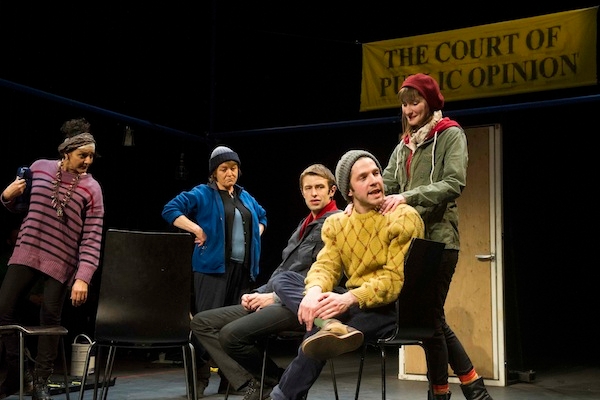Who got the most out of the credit crunch? Security guards, repossession firms, bailed-out banks and, of course, playwrights. Anders Lustgarten is the latest to cash in on five years of global misery with If You Don’t Let Us Dream, We Won’t Let You Sleep. The play, like the title, is effortful, disjointed and cumbersome. In the first half, a gang of fatcat bankers sets up a new financial instrument, Unity Bonds, which will generate profits from socially useful behaviour. This intriguing idea is sidelined in the second half. The action moves to a squatter camp where the banking system is about to be put on trial.
Lustgarten assumes, no doubt correctly, that the audience is more in sympathy with anti-capitalists than with high finance. So he sets about smearing the culture of the City. A contrite Goldman Sachs insider describes the thrill of his career. Press a button, he says, and a thousand people in Mumbai lose their jobs. ‘Do you have any idea how good that feels?’ Even allowing for rhetorical exaggeration, this is a fantasy. No banker has the drone-like power to zap an Indian factory from a computer screen in Canary Wharf. And to imagine that anyone would derive pleasure from destroying strangers’ livelihoods is just bizarre. Bankers get a kick out of making money and that means creating prosperity, not exterminating it.
Lustgarten, perhaps without realising it, also exposes the anti-capitalist squatters as a gang of hypocritical, sanctimonious thugs. They’re keen to denounce all property rights except when the property in question is their own. They’re even prepared to intimidate innocents to defend the privileges of ownership. One protestor, believing himself to have been bilked by a local café, demands a refund and threatens to ‘occupy’ the premises if his request is denied. Very revealing. His belief that capitalism is theft backed up by violence is merely a silhouette of his personal morality projected on to the market-place.
Lustgarten is a smart, well-read and eloquent writer and it’s a shame that he divides the world simplistically into saintly anarchists and evil pinstripes. He seems dimly aware that the crisis of capitalism requires a more subtle approach and, just occasionally, he lets the protestors utter a self-critical insight. ‘The best protection against pro-corporate police violence,’ says one, ‘is a mobile phone, with a camera in it, made by a corporation.’
The play’s two halves cohere rather poorly and the script disintegrates into an anthology of intriguing economic theories rather than unifying around a single narrative thread. The trial of the bankers comes to nothing and the action finishes on a sentimental note of suspense. The play’s lasting value lies in its characterisation of the entire banker-bashing enterprise. Cloaked as a quest for ‘global fairness’, the anti-capitalist cause is nothing more than a craven desire to avenge personal woes by inflicting punishment on a convenient scapegoat. These spasms of mass vindictiveness are nothing new, of course. They gave America McCarthyism. They gave Europe fascism.
Bottleneck, at Soho Theatre, is a monologue performed with oodles of violent gusto by James Cooney. Greg, a 14-year-old Liverpool fan, brims with forthright views about the world. His mother’s a slag. His father’s a bully. His teacher’s a paedo. His schoolmate, Sarah-Jane, has ‘a fanny that tastes of Quavers’. He raises money for a football ticket by stealing from a ‘fat dozy wanker pleb’ who lives nearby. Everything he dislikes — and he dislikes most things — he denounces as ‘gay’.
Coarse language, deployed imaginatively, can be a captivating instrument but Luke Barnes, the writer, seems intent on depressing literature and poisoning drama. Here’s the script’s most creative insult. ‘How’s it feel to have a face like Keith Chegwin’s bum-hole?’ The sophisticated Soho crowd giggled nervously at this sad barrage of paranoid sexual bigotry.
Greg’s football ticket takes him to the notorious Hillsborough semi-final of April 1989. He gets caught in the crush, survives by accident, and phones his dad, who weeps over the phone. His best mate dies. The tragedy has no effect on him other than to raise the temperature of his misanthropic bloodlust very slightly. A schoolmate, Kev, giggles during a memorial service, and Greg imagines cutting Kev’s face off ‘with a rusty bread knife’, castrating his younger brother and inflicting unspeakable torments on his first-born child. True, Greg is a hopeless wreck of an individual but the memory of that lovely spring afternoon, and the tragedy that unfolded under its glorious skies, is dishonoured by this foul-mouthed, pea-brained psycho. Football has more intelligent and sympathetic voices than this. So does Liverpool. Merseyside should disown this witless libel on its decency.







Comments